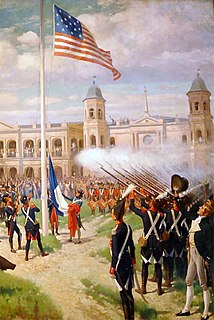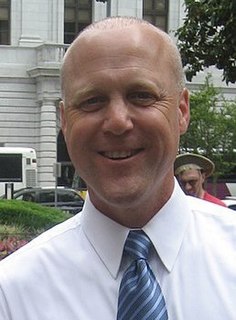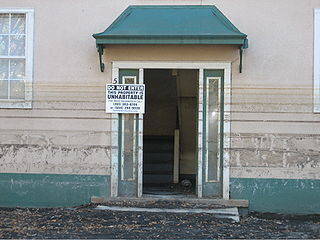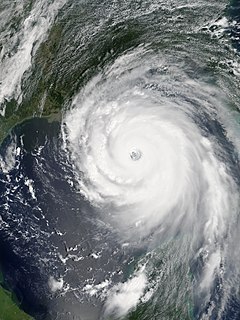Related Research Articles

New Orleans is a consolidated city-parish located along the Mississippi River in the southeastern region of the U.S. state of Louisiana. With an estimated population of 390,144 in 2019, it is the most populous city in Louisiana. Serving as a major port, New Orleans is considered an economic and commercial hub for the broader Gulf Coast region of the United States.

The history of New Orleans, Louisiana, traces the city's development from its founding by the French in 1718 through its period of Spanish control, then briefly back to French rule before being acquired by the United States in the Louisiana Purchase in 1803. In the 19th century, New Orleans was the largest port in the South, exporting most of the nation's cotton output and other products to Western Europe and New England. It was the largest and most important city in the South, thus it was an early target for capture by the Union during the Civil War. With its rich and unique cultural and architectural heritage, New Orleans remains a major destination for live music, tourism, conventions, and sporting events and annual Mardi Gras celebrations, even after the significant destruction and loss of life resulting from Hurricane Katrina in 2005.

Marc Haydel Morial is an American political and civic leader and the current president of the National Urban League. Morial served as Mayor of New Orleans, from 1994 to 2002, President of the United States Conference of Mayors in 2001, and as a Louisiana State Senator from 1992 to 1994.

Mitchell Joseph Landrieu is an American attorney and politician who was Mayor of New Orleans from 2010 to 2018. A Democrat, Landrieu served as Lieutenant Governor of Louisiana from 2004 to 2010.

Clarence Ray Nagin Jr., also known as C. Ray Nagin, is an American former politician and convicted felon who was the 60th Mayor of New Orleans, Louisiana, from 2002 to 2010. A Democrat, Nagin became internationally known in 2005 in the aftermath of Hurricane Katrina.

Criticism of the government response to Hurricane Katrina consisted primarily of condemnations of mismanagement and lack of preparation in the relief effort in response to Hurricane Katrina and its aftermath. Specifically, there was a delayed response to the flooding of New Orleans, Louisiana.

The reconstruction of New Orleans refers to the rebuilding process endured by the city of New Orleans after Hurricane Katrina destroyed much of the city on August 29, 2005. The storm caused levees to fail, releasing tens of billions of gallons of water. The levee failure contributed to extensive flooding in the New Orleans area and surrounding parishes. About 80% of all structures in Orleans Parish sustained water damage. Over 204,000 homes were damaged or destroyed, and more than 800,000 citizens displaced — the greatest displacement in the United States since the Dust Bowl of the 1930s. Wind damage was less severe than predicted. The damage that took place that needed to be repaired cost about $125 billion.

This article contains a historical timeline of the events of Hurricane Katrina on August 23-30, 2005 and its aftermath.

Hurricane Katrina struck the United States in August 2005, causing over a thousand deaths and extreme property damage, particularly in New Orleans. The incident affected numerous areas of governance, including disaster preparedness and environmental policy.
Sidney John Barthelemy is a former American political figure. The second African American to hold the New Orleans mayoral chair, he was a member of the Louisiana State Senate from 1974 to 1978 and a member at-large of the New Orleans City Council from 1978 to 1986. He served as mayor of New Orleans from 1986 to 1994. He is a member of the Democratic Party.

The Lower Ninth Ward is a neighborhood in the city of New Orleans, Louisiana. As the name implies, it is part of the 9th Ward of New Orleans. The Lower Ninth Ward is often thought of as the entire area within New Orleans downriver of the Industrial Canal; however, the City Planning Commission divides this area into the Lower Ninth Ward and Holy Cross neighborhoods.

The Urban Land Institute, or ULI, is a nonprofit research and education organization with regional offices in Washington, D.C., Hong Kong, and London. Its stated mission is "to provide leadership in the responsible use of land and in creating and sustaining thriving communities worldwide". ULI advocates progressive development, conducting research, and education in topics such as sustainability, smart growth, compact development, place making, and workforce housing.

Broadmoor is a neighborhood of the city of New Orleans. A subdistrict of the Uptown/Carrollton Area, its boundaries as defined by the City Planning Commission are: Eve Street to the north, Washington Avenue and Toledano Street to the east, South Claiborne Avenue to the south, and Jefferson Avenue, South Rocheblave Street, Nashville Avenue, and Octavia Street to the west. It includes the Broadmoor Historic District which was listed on the National Register of Historic Places in 2003 and increased in its boundaries in 2007.

The first round of the New Orleans mayoral election of 2006 took place on April 22, 2006; a runoff between incumbent Mayor Ray Nagin and Louisiana Lieutenant Governor Mitch Landrieu took place on May 20, resulting in reelection for Mayor Nagin. The Mayor of New Orleans is the top official in New Orleans' mayor-council system of government.
Ron Forman is the head of the Audubon Nature Institute and was one of the leading candidates in the New Orleans mayoral election, 2006. A past president of the American Zoo and Aquarium Association, Ron Forman began his tenure with Audubon Park and Zoological Garden in 1972 as City Hall liaison. Made Deputy Director in 1973 and Executive Director in 1977, the major transformation of Audubon Zoo from an "urban ghetto" to an "urban Eden" was underway.

William Harold Nungesser, is an American politician serving as the 54th Lieutenant Governor of Louisiana.

Scott S. Cowen is currently the Interim President of Case Western Reserve University in Cleveland, Ohio, and President Emeritus and Distinguished University Chair of Tulane University in New Orleans, Louisiana, where he was also Seymour S. Goodman Memorial Professor in the A.B. Freeman School of Business and professor of economics in Tulane's School of Liberal Arts. He has written more than a hundred peer-reviewed journal articles and five books. His most recent book, Winnebagos on Wednesdays: How Visionary Leadership Can Transform Higher Education, was published by Princeton University Press in 2018. Cowen is the eponym of Tulane's Cowen Institute for Public Education Initiatives. Cowen served as Tulane’s 14th president from July 1998 through June 2014.
Leslie Rosenthal Jacobs is an award-winning education reform advocate, business executive, and philanthropist. Born in New Orleans, she built her family's small, independent insurance agency into one of the largest in the South, before merging the Rosenthal Agency with Hibernia National Bank. For the last 25 years, she has been a passionate voice for education reform, serving initially as an elected member of the Orleans Parish School Board, and then, as a member of the State Board of Elementary and Secondary Education (BESE). She is also the founder of "Educate Now!", a non-profit dedicated to continuing the broad, post-Katrina reforms of New Orleans public schools she helped institute and execute as a member of the BESE.

LaToya Cantrell is an American politician serving as the Mayor of New Orleans, Louisiana, a post she has held since May 7, 2018. Cantrell, a Democrat, is the first black woman to hold the post. Before becoming mayor, Cantrell represented District B on the New Orleans City Council from 2012–2018.

Michael Leonard Hecht is an American economic developer and businessman based in New Orleans, who is currently President & CEO of Greater New Orleans, Inc, the post-Hurricane Katrina economic development organization for the New Orleans region. Hecht has previously led the post-Katrina Business Recovery Program for the State of Louisiana, and the post-9/11 Small Business Assistance Program for New York City.
References
- ↑ "New Orleans enlists VIPs for rebuilding / Mayor's 17-person advisory board has array of civic leaders". sfgate.com.
- ↑ "www.bringneworleansback.org". bringneworleansback.org.
- ↑ "Archived copy". Archived from the original on 2006-05-08. Retrieved 2006-02-10.CS1 maint: archived copy as title (link)
- ↑ "Manning Architects - Complete Architecture, Interior Design and Planning Services in New Orleans, Dallas and Las Vegas". manningarchitects.com.